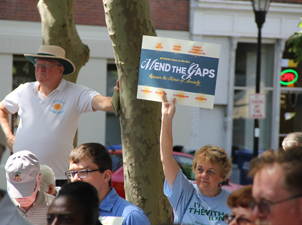
Inflation Inequality and the Common Good
Claire Guzdar
November 6, 2019
In the summer of 2013, I accepted a position at NETWORK as the incoming Field Associate and prepared to pack up my things and move to Washington DC. It was a big change, but I knew it was the right choice when I saw Sister Simone testify in front of Congressman Paul Ryan’s House Budget Committee.
In her testimony, Sister Simone emphasized the injustice of people being hungry, bankrupt, and without healthcare in our wealthy nation. She painted a picture using statistics and stories to reinforce one another. And she refused to accept the conservative, neoliberal economic narrative Representative Paul Ryan tried to advance about the “free market” being the solution to inequality.
NETWORK taught me there are changes we can make to have a more just economy today. There is no such thing as a “free market”–our economy is made up of millions of interactions each day, and the rules of the economy are set by a series of choices made by policymakers to deliver the desired economic outcomes. To influence economic outcomes, reduce inequality, and improve the lives and well-being of people experiencing poverty, we need policymakers to make different choices.
I’m still advocating for those better choices as the Associate Director of Campaigns and Partnerships at the Groundwork Collaborative, where we’re working to develop and advance a coherent progressive economic worldview. To do this, we’re supporting research that helps us more clearly understand the ways in which our economy excludes marginalized communities.
This week, Groundwork partnered with Christopher Wimer and Sophie Collyer from the Columbia Center on Poverty and Social Policy and Xavier Jaravel from the London School of Economics on a new policy brief that reveals we have undercounted the number of Americans in poverty and the real wages of low-income families. This research shows there are at least 3.2 million more people in poverty in 2018 than official reporting suggests because of a phenomenon called inflation inequality, which essentially means that inequality is so extreme it has been driving inflation to rise more quickly for low- and middle-income people than for the wealthy.
Further, when adjusted for inflation inequality, household income for the bottom quintile of income earners declined from 2004 to 2018 by more than 7% — much more than the 1% originally reported. Stunningly, the average middle-income household lost about $1,250 in 2018 due to higher prices caused by inflation inequality.
The data Groundwork released this week is also proof of what lived experience has been telling us — what people all over the country continue to tell Sister Simone as she travels and brings back their stories back to DC: inequality is not just an outcome of an unjustly designed economy, it is a cause of the squeeze being felt by economically struggling people. During the 2016 and 2018 Nuns on the Bus tours, I watched as NETWORK traveled the country calling for policies that mend the gaps and advocating for tax justice. All around the country, families and individuals shared stories of wages stagnating while the cost of housing, transportation, and healthcare continue going up. Along with these stories, this research on inflation inequality from Groundwork helps us more accurately understand the state of poverty, wages, and inequality so we can work for the best, most affecting solutions. It is time for us to reshape our economy so that it works for the common good, not just for those at the top.
Claire Guzdar is the Associate Director of Campaigns and Partnerships at Groundwork Collaborative, working to advance a cross-cutting economic narrative for the progressive movement. Prior to her work with Groundwork, Claire was Associate Director of the Faith and Progressive Policy Initiative at the Center for American Progress and a Field Associate at NETWORK.







